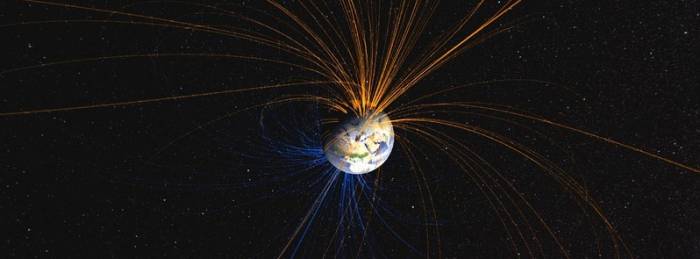The repercussions of such an event included “devastating streams of particles from the sun, galactic cosmic rays, and enhanced ultraviolet B rays from a radiation-damaged ozone layer”.
Reports warned of a world in which computers, mobile phones and even flushing toilets ceased to work, and parts of the Earth became devoid of life.
Now, a well-timed paper published in the scientific journal Proceedings of the National Academy of Sciences titled “Earth's magnetic field is probably not reversing” has helped quieten some of the wilder speculation about this proposed doomsday scenario.
What is the Earth’s magnetic field?
Earth’s magnetic field is generated deep within the core of the planet by metals including iron and nickel.
The magnetic field protects Earth from solar winds and harmful cosmic radiation. It also helps both humans and animals to navigate, and protects our telecommunication and satellite systems.
If the two magnetic poles were to switch places, something that has happened periodically over the course of Earth’s history, all of this would be compromised.
Why did people get the idea the magnetic poles were about to flip?
Since 1840, the year scientists began to measure such things, the global strength of the Earth’s magnetic field has been declining at a rate of around 5 per cent per century.
This weakening, combined with the expansion of a particularly weak area in the planet’s magnetic field called the South Atlantic Anomaly, led to speculation that Earth’s magnetic fields were about to reverse.
The last time such a “geomagnetic reversal” or “excursion” happened was 780,000 years ago, but coverage of this phenomenon has suggested such an event is right around the corner.
What sparked the wave of concern at the beginning of 2018?
An extract from a book by journalist Alanna Mitchell was published on the science website Undark.
The book was titled The Spinning Magnet: The Electromagnetic Force That Created the Modern World — and Could Destroy It, and the extract included a warning that it was “time to wake up to the dangers and start preparing” for a magnetic pole reversal.
This warning was picked up with gusto and soon many other articles were popping up warning of the dangers of an imminent pole reversal.
However, the new study suggests the worst of these fears may have been unwarranted.
What are scientists saying?
Based on the Earth’s history of flipping its magnetic field, something which can be calculated based on magnetics minerals in rocks, they think such an event is unlikely to happen any time soon.
“There has been speculation that we are about to experience a magnetic polar reversal or excursion,” said Professor Richard Holme, a geomagnetism expert at the University of Liverpool.
“However, by studying the two most recent excursion events, we show that neither bear resemblance to current changes in the geomagnetic field and therefore it is probably unlikely that such an event is about to happen.
"Our research suggests instead that the current weakened field will recover without such an extreme event, and therefore is unlikely to reverse."
Instead, the scientists predict it may take thousands of years before Earth’s magnetic field reverses again.
Does this mean there definitely won’t be a pole reversal that destroys the world?
Scientists are certainly aware of the possibility that the Earth’s magnetic field will flip its polarity at some point in the future. As Nasa states in a post on its website from 2011: “Reversals are the rule, not the exception”.
In the Undark extract, Ms Mitchell quotes physicist Dr Daniel Baker of the University of Colorado, Boulder saying he fears parts of the planet will become uninhabitable during such a reversal.
However, the consensus still seems to be that even if such an event did take place, its outcomes would not be as serious as some commentators have made out:
“Many doomsday theorists have tried to take this natural geological occurrence and suggest it could lead to Earth's destruction,” Nasa continued in their post.
“But would there be any dramatic effects? The answer, from the geologic and fossil records we have from hundreds of past magnetic polarity reversals, seems to be 'no.'”
The Independent
More about: Earth
















































